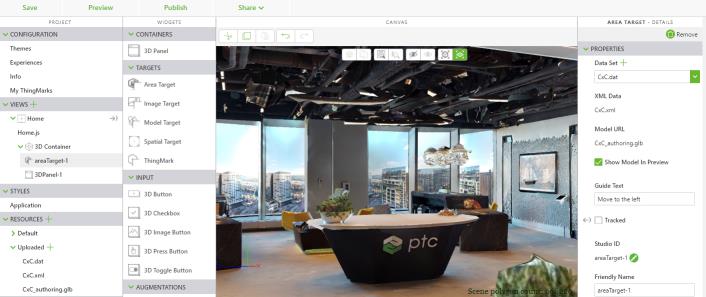|
Property
|
JavaScript
|
Type
|
Description
|
||
|
Text
|
text
|
string
|
Text displayed on the widget.
|
||
|
Height
|
height
|
number
|
The height of the label. By default, this is set to 0.05 (or when the field is left empty).
|
||
|
Width
|
width
|
number
|
The width of the label.
|
||
|
Class
|
class
|
string
|
The class assigned to the widget.
The following CSS properties are currently supported:
• font-family—sets the font family
• color—sets the font/fill color
• --text-stroke-color—similar to color, but sets the font stroke color
• --text-stroke-width—sets the width of the stroke
• font-weight—sets the weight, or thickness, of the font
• font-style
—sets the font style of the font (normal, italic, oblique, etc.)
• background-color—sets the fill color of the label
• text-decoration—supports underline
• border-color—sets the color of the border around the label
• border-radius—rounds the corners of the border around the image
• border-style—sets the style of the border around the label
• border-width—sets the stroke width of the border around the label
• border—combines border-color, border-style, and border-width
• padding—applies padding outside the label text
For example, in the PROJECT pane, under STYLES, click Application and enter the following in the editor:
.my-label {
font-family: Century Gothic; color: black; --text-stroke-color: yellow; --text-stroke-width: 3px; font-weight: normal; font-style: italic; background-color: grey }
Then, in the Class field of the 3D Label, enter: my-label. This refers to content added in > .
|
||
|
Enable State-Based Formatting
|
enableStateFormatting
|
boolean
|
Allows you to format the widget based on state definitions that have been defined in ThingWorx.
If the checkbox is selected the following properties appear:
• Dependent Field
• State Definition
For example, if a 3D label has a State Definition value of error, the label turns red.
For more information about style and state definitions in ThingWorx, see Style and State Definitions in the ThingWorx Help Center.
|
||
|
Dependent Field
|
stateFormatValue
|
string
|
This property is visible if the Enable State-Based Formatting checkbox is selected. For more information about style and state definitions in ThingWorx, see Style and State Definitions in the ThingWorx Help Center.
|
||
|
State Definition
|
stateFormat
|
boolean
|
This property is visible if the Enable State-Based Formatting checkbox is selected. For more information about style and state definitions in ThingWorx, see Style and State Definitions in the ThingWorx Help Center.
|
||
|
Font Family
|
fontFamily
|
string
|
Style of the font. Enter a valid font family such as Arial, Times New Roman, Century Gothic, etc. By default, this is set to Arial.
|
||
|
Font Color
|
fontColor
|
string
|
Color of the font. Enter a color name, Hex value, or RGBA value. For example, if you want the font color to be red, you can enter any of the following:
• red
• #FF0000
• rgba(255, 0, 0, 1)
By default, this is set to black.
|
||
|
Font Outline Color
|
fontOutlineColor
|
string
|
Color of the font outline. Enter a color name, Hex value, or RGBA value. For example, if you want the outline of the label to be red, you can enter any of the following:
• red
• #FF0000
• rgba(255, 0, 0, 1)
By default, this is set to white.
|
||
|
Scale
|
scale
|
string
|
Scale of the label.
|
||
|
X Coordinate
|
x
|
number
|
Location of the label on the x-axis.
|
||
|
Y Coordinate
|
y
|
number
|
Location of the label on the y-axis.
|
||
|
Z Coordinate
|
z
|
number
|
Location of the label on the z-axis.
|
||
|
X Rotation
|
rx
|
number
|
Rotation of the label about the x-axis.
|
||
|
Y Rotation
|
ry
|
number
|
Rotation of the label about the y-axis.
|
||
|
Z Rotation
|
rz
|
number
|
Rotation of the label about the z-axis.
|
||
|
Billboard
|
billboard
|
boolean
|
Rotates a widget around its center so it is always facing the viewer. It is aligned with the screen.
|
||
|
Occluding
|
occlude
|
boolean
|
If selected, the geometry of a widget is invisible, but at the same time hides any other augmentations behind it in the 3D scene.
Therefore, the background or camera feed appears where the occluded widget should be. This can be used to emphasize some augmentations by hiding surrounding 3D geometry.
|
||
|
Always on top
|
decal
|
boolean
|
Overlays the widgets geometry on any other augmentations in the scene regardless of its depth in the 3D scene. If set to Yes, it is never hidden by other augmentations. Typically this can be used for labels or sensors that must always remain visible.
|
||
|
Opacity (1 Opaque - 0 Transparent)
|
opacity
|
number
|
A number between 0 and 1 that controls the level of transparency of the object. 0=completely transparent and 1=completely opaque.
|
||
|
Pivot
|
pivot
|
number
|
Determines the pivot point of the image:
• Top Left
• Top Center
• Top Right
• Middle Left
• Middle Center
• Middle Right
• Bottom Left
• Bottom Center
• Bottom Right
|

